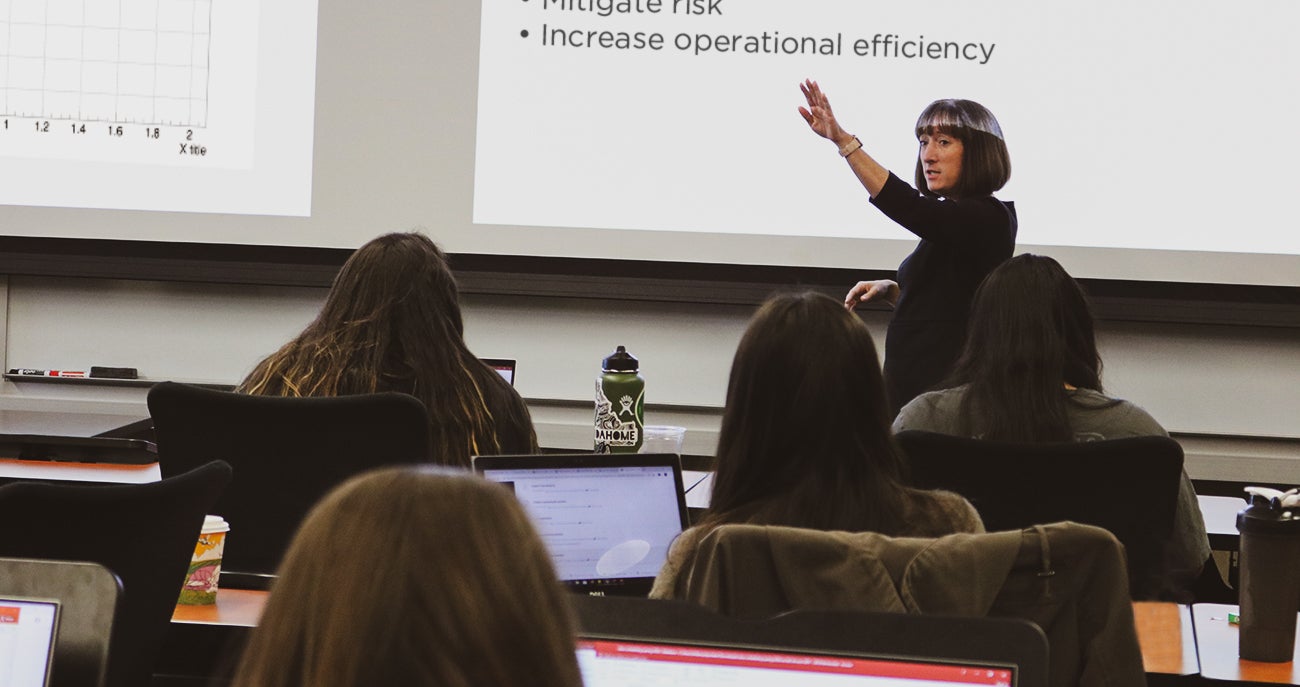Ready to enroll?
To enroll in the certificate, log in to myBoiseState and follow these instructions (Change my Major). The Certificate in Business Analytics (CBA) is offered by the College of Business and Economics. If you have any questions, please contact us at itscm@boisestate.edu.
Need more information? Read on!
- Get your Certificate in Business Analytics (CBA) in as little as 6-7 additional credits (COBE and HIIM students)
- Enrollment is ongoing and can be done at any time.
- You can apply current courses, future courses and previously completed courses towards the certificate.
- Most undergraduate majors welcome*.
*Business and Economics Analytics Majors are not eligible for the Certificate.
Five Reasons You Should Learn Data Analytics:
- Job growth
- Analytics is everywhere
- A range of related skills
- Gain problem-solving skills
- It’s only becoming more important
(Source: sas.com)
Job Outlook

“According to McKinsey & Company, in 2018 there was a shortage of 1.5 million managers and analysts who were able to use analytical concepts to make data-driven decisions. According to PwC and Iron Mountain, in 2015 only 4% of companies had the skills or technology to make the best use of the data they collect. This mismatch or skills gap … represents significant opportunities for non-data scientists to fill some of that technical skill gap while bringing their other functional expertise to the table.” (Source: coursereport.com)
Learn Essential Skills

- SQL
- Data mining and machine learning
- Excel
- Critical thinking
- Problem-solving
- Statistical analysis
- Visualization
For most COBE majors and HIIM majors, only 6-7 credit hours beyond your major are needed to earn a Certificate in Business Analytics. Management majors must take 10 credit hours beyond their major. Other majors may require up to 18 credit hours.
Courses
Required Classes (12-15 credit hours):
- ITM 105 Spreadsheet Topics (or test out), 2 credit hours – Develops basic to intermediate spreadsheet skills using Excel and then further expands on these skills through business discipline-specific assignments
- ITM 106 Database Topics (or test out), 1 credit hour – Basic to intermediate database skills development, hardware, software, Internet and networking concept materials for use in the workplace, educational settings and the home.
- ITM 310 Business Intelligence, 3 credit hours – Study of information technology resources that support decision making in organizations. Enterprise systems, databases, networks, and other technologies that support the collection, organization, and analysis of data are discussed.
Skills necessary to collect, process, analyze, and present business intelligence are practiced through hands-on project experience. Ethical, legal, and behavioral issues of conducting business intelligence considered throughout. - ITM 315 Database Systems, 3 credit hours – Introduction to design, development and administration issues of relational databases and DBMS and their applications to real business problems. Special emphasis on SQL, logical data design techniques, XML and rapid prototyping of end-user business applications.
- ITM 430 Predictive Analytics, 3 credit hours – Fundamentals of predictive analytics will be examined. Topics will include problem definition, data preparation and the use of analytic techniques to solve business problems. Modeling techniques will focus on predictive analytics utilizing both data and text. (This class was formerly numbered as ITM 330, this is the same course with a new number).
Statistics course, 3 credit hours (choose one of the following):
- BUSSTAT 207 Introduction to Business Analytics – Provides an introduction to business analytics through working knowledge of descriptive and inferential statistics concepts such as discrete and continuous probability distributions, sampling distributions, confidence interval estimates, and hypothesis testing.
- MATH 254 Introduction to Statistics – Precalculus treatment of descriptive statistics, confidence intervals, hypothesis testing, simple linear regression, correlation, introduction to probability. Emphasis on reasoning, problem-solving, communicating ideas and applications to a wide variety of disciplines.
- MATH 360 Engineering Statistics – Calculus-based survey of statistical techniques used in Engineering. Data collection and organization, basic probability distributions, sampling, confidence intervals, hypothesis testing, process control, simple regression techniques, design of experiments. Emphasis on examples and applications to engineering, including product reliability, robust design and quality control.
- MATH 361 Probability and Statistics I – Calculus-based treatment of probability theory, random variables, distributions, conditional probability, central limit theorem, descriptive statistics, estimation, tests of hypotheses, and regression. Differs from MATH 360 by providing more thorough coverage of theoretical foundations and a wider variety of applications drawn from natural and social sciences as well as engineering.
Electives (choose one, 3 credit hours):
- ACCT 350 Accounting Information Systems – The study of the intersection of accounting, information technology, and data for decision making. Topics include the information life cycle, modeling business processes, frameworks and current assessment of governance, risk management, internal control and information security. Applied projects and use of software in process modeling, design of controls, and data analytics.
- ECON 342 Econometrics – The second of a two-semester sequence in quantitative economic analysis. This course emphasizes the application of statistics to the construction, estimation, and evaluation of econometric models. Other related topics will include history and methodology of econometrics, forecasting, computer application and the use of econometrics in business and government.
- FINAN 440 Financial Modeling – Provides hands-on experience using spreadsheets to solve financial problems. Concentrates on
bringing classic financial theory into practical settings. Cost of capital, financial statement modeling, valuation, portfolio models and the efficient set, option pricing and bond mathematics. - ITM 340 Big Data and Web Analytics – Explores challenges and opportunities with Big Data and Web 2.0 using R Project. Topics include an introduction to Big Data and Web 2.0, introduction to R Project for Statistical Computing, sourcing data from web-based applications, data cleaning and preparation, structured and unstructured data analysis, and visualizing and communicating findings.
- ITM 415 Advanced Database – Advanced database management system design principles and techniques. Topics include, but are
not limited to, advanced SQL statements, access methods, query processing and optimization, concurrency controls, non-relational databases. - MKTG 315 Marketing Insights – Generate consumer insights via the marketing research process to support management decision-making and solve marketing problems. Define the research problems, develop research plans, collect data, analyze the data, and communicate recommendations.
Advising notes – enroll in the certificate
- Students new to Boise State for fall 2020 will be able to enroll in the certificate at the time that they enroll in classes for fall 2020. They should use the “Change my major” link at myBoiseState.
- Students in catalog years prior to 2020-2021 will need to submit the catalog update form in order to enroll in the certificate program. They should fill out the section of the form labeled: Add a Minor or Certificate Not Available in Your Catalog Year. Currently, the form can be submitted to the Office of the Registrar at regmail@boisestate.edu from your Boise State email address without a signature. These students will be able to count courses taken prior to fall 2020 towards the certificate.
- Students in majors outside of COBE (see catalog for exceptions) will need to request a permission number in order to enroll in the required class ITM 315. Please contact itscm@boisestate.edu to initiate this.
Interested in a Bachelor’s Degree in Analytics?
Check out our Business and Economics Analytics major.